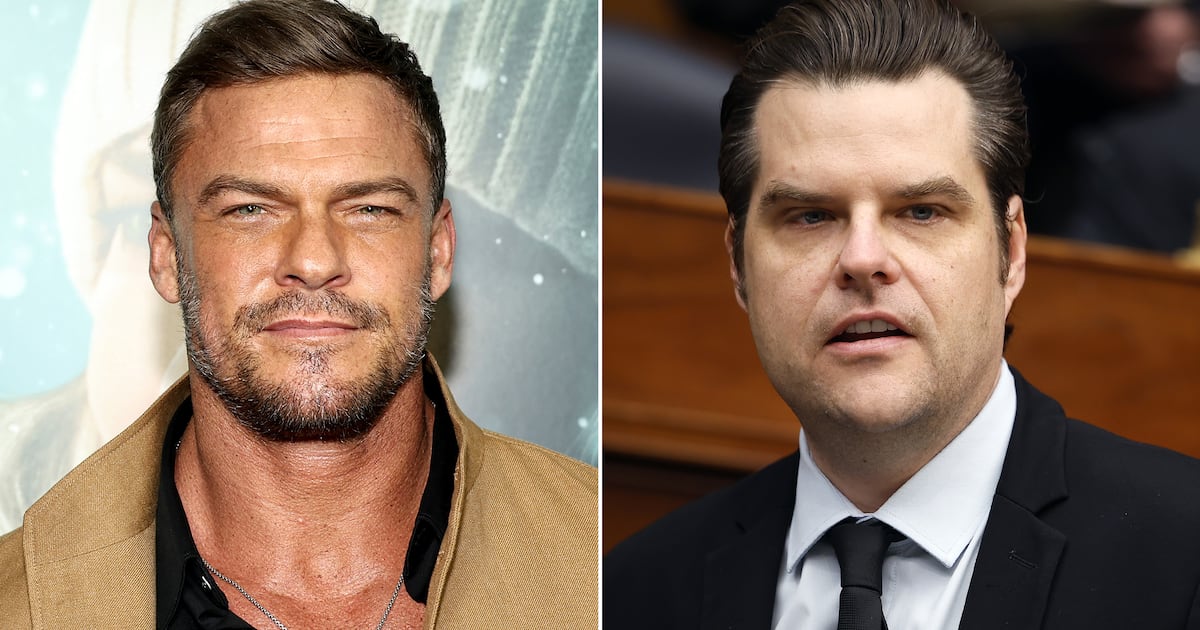Four days after joining the New Hampshire Republican primary, U.S. Senate hopeful and bitcoin millionaire Bruce Fenton compared the widespread adoration of Ukrainian President Volodymyr Zelensky to the reaction to Osama bin Laden, warning that bin Laden was also once seen as a “hero.”
Fenton spun up the cautionary tale last week in his first televised interview as a candidate, telling WMUR’s Adam Sexton that “there’s so many parallels right now between Ukraine and the Taliban.”
“Remember, as Zelensky is a hero now, Osama bin Laden was once considered a hero,” Fenton said.
It’s true that bin Laden—a mass-murdering terrorist and sworn enemy of the United States who was killed in a 2011 U.S. Navy SEAL team raid—was hailed by devoted followers. But that was not the pernicious idolatry to which Fenton was referring.
Fenton, who served for a time in the Navy as a hospital corpsman and claims to have completed “much of” SEAL training, was instead referring to the United States. Specifically, the 1980s, when bin Laden battled the Soviet Union alongside the Afghan mujahideen, which American operatives secretly armed as a proxy force.
“There were articles talking about how he was leading his army on a road to peace. There is a hero in a James Bond movie based on bin Laden,” Fenton explained, inaccurately.
The article he was apparently referencing—“Anti-Soviet warrior puts his army on the road to peace”—addressed bin Laden’s life after he decamped Afghanistan for Africa, in 1993. It also ran in The Independent, which is based in the United Kingdom, not the United States.
Further, the phrase “road to peace” only appears in the headline, as an ironic dig at bin Laden’s transparent attempt to pave over his militaristic reputation with a civic engineering project in Sudan. The report itself is deeply skeptical of the warlord, noting that “Outside Sudan, Mr. bin Laden is not regarded with quite such high esteem.” It even quotes bin Laden directly denying that the United States ever supported him: “Personally neither I nor my brothers saw evidence of American help.”
As for the Bond film, The Living Daylights (1987), that too was the work of a Brit—director John Glen—and starred English actor Timothy Dalton. It pitted the fictional MI6 agent against the Soviets in Afghanistan, and featured a mujahideen protagonist some have theorized shares traits with bin Laden. (While MGM Studios reportedly pulled the DVD briefly after the 9/11 attacks, it’s not clear if that was a comment specifically on the character.) Later, the producers of the 2002 Bond movie Die Another Day considered modeling its villain after bin Laden, before rerouting the action to North Korea.
In the interview, Fenton went on to bemoan the CIA’s Reagan-era meddling in Afghanistan as a possible parallel for the Russian invasion of Ukraine, warning that the United States should only deploy troops if “it is a true threat to the U.S. Constitution.”
The Biden administration has repeatedly shot down the idea of sending troops to Ukraine, though it has provided more than a billion dollars in military aid and appears to be training or preparing to train Ukrainian troops in Poland.
But this isn’t the first time Fenton made this specious argument. He wrote something similar in a lengthy 2015 Facebook post, kicking off with, “Our government once thought Osama bin Laden was a hero.”
Fenton’s remarks can also be contrasted with a 2003 editorial letter criticizing the U.S.-led invasion of Iraq, in which he claimed he “disagree[d] with the premise that the ‘world is a safer place with Saddam behind bars.’” The letter is still hosted on his investment company’s website.
A hardcore libertarian multimillionaire with no political experience, Fenton has designed a campaign platform to cut against the grain.
In the WMUR interview, the amateur crypto cartoonist voiced support for defunding the police—“not in the ways that most of the people that use that slogan say so. What we should do is have less laws”—and said flatly that the U.S. government’s appropriate response to the COVID-19 pandemic should have been “nothing.”
He also openly worships wealth—once posting that “billionaires are cool”—and says that he plans to self-fund his campaign with up to $5 million of Bitcoin. A week before he announced his candidacy, Fenton told Politico, “If I were to run, it would be for all Bitcoiners and all New Hampshire residents.”
While Fenton may be a longtime resident of the crypto community, he only joined Granite Staters recently. In 2017, he left his home state of Massachusetts to join New Hampshire’s Free State Project, a group of fringe libertarians who advocate for secession—in hindsight a curious choice for someone now willing to burn millions of dollars for the chance to join the federal government.
But that biographical quirk will certainly set him apart from the three other candidates in the Republican field, all of whom pack government experience—former state Senate president Chuck Morse; former Londonderry town manager Kevin Smith; and retired Brigadier General Don Bolduc, who lost in the 2020 Senate primary.
One of the only cardinal positions Fenton shares with the conservative mainstream is his outward skepticism of the 2020 election, which he said is haunted by “a lot of very suspicious things,” leading him to conclude that “the credibility of the election is under threat.”
Ahead of announcing his run, Fenton told the Union Leader, “You can’t run on a playbook built in the last 30 years, because that world is gone.”
“We are in a new territory right now,” said the former Bay Stater-turned-New Hampshirite. “I haven’t seen anybody talking with the level of urgency and importance that I feel about these issues.”









